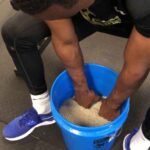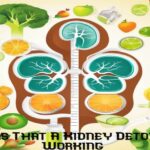Endo Belly: If you have Endometriosis, I may have told you that one of the side effects of the disease is severe bloating and abdominal distension, commonly referred to as endo belly or endo bloat. The medical term for this condition is called panniculus, which refers to the abdomen being swollen and protuberant (or puffed out). Some women experience this symptom of Endometriosis only occasionally, while others constantly suffer.
What Causes Endo Belly?
For those with Endometriosis, especially in severe cases, bloating can be a severe problem. Sometimes it’s so painful that it feels like you’re about to burst! What causes all of that bloating? Some people think constipation could be a factor, but research has shown that hemorrhoids and varicose veins cause it. If you suffer from endo belly or are just curious about what may cause some of your extreme pain in that area, take a look at these tips below.
Endo Belly Symptoms
The main symptom of the endo belly is severe bloating, especially during or right before your period.
Bloating is when the abdomen fills with air or gas, making it look larger. It may also feel tight or stiff to the touch.
Endo belly can cause discomfort, pain, and pressure in your abdomen and back. The lower abdomen can swell for days, weeks, or just a few hours.
Many women who experience endo belly say they “look pregnant,” even though they’re not.
Endo’s belly is just one symptom of Endometriosis. Women who experience endo belly have other gastrointestinal symptoms, such as:
What Can I Do About My Endo Belly?
It can be hard to exercise when you have severe bloating. However, you must try! If possible, find a low-impact activity that can help you relieve stress and improve your overall mood. Aim for at least 30 minutes of physical activity each day, including moderate exercise. And make sure to drink lots of water! It will help keep your body strong and maintain healthy skin and digestion.
Why Does Endo Belly Happen
Endometriosis is a disease that causes uterine tissue to grow outside of its standard location. The tissue can attach to other organs, like your ovaries, bowels, bladder, and abdominal and pelvic walls. This tissue often grows in different layers within and between muscles (called adhesions), making it difficult for doctors to treat. Because of these adhesions, organs can become trapped in areas they don’t belong, leading to digestive problems. Endometriosis is a leading cause of severe bloating, often referred to as endo belly, but that doesn’t mean there’s no hope! These four steps will help you start managing your severe bloating symptoms caused by Endometriosis.
How Can You Treat Endo Belly?
You can take plenty of steps before going under a surgeon’s knife. If you suffer from an endo belly, try eating six small meals each day instead of three larger ones. Eating more often helps regulate your blood sugar and insulin levels. Also, ensure you’re adequately hydrated and have an adequate water intake, particularly before meals. The secret is avoiding foods high in refined carbohydrates, such as white bread, white rice, and potatoes.
They quickly break down into sugar in your body which triggers sharp spikes in blood sugar and insulin levels, the last thing you want if you want to manage endo belly symptoms! Instead, choose whole grains like quinoa, farro, or barley for carbohydrate-rich meals.
Can I Prevent Endo Belly?
From fatigue, swelling, and pain during periods to severe bloating that doesn’t respond to diet or exercise, endometriosis symptoms can take a heavy toll on women. A common symptom is painful bowel movements from the gas buildup around an impacted bowel. Other signs include feeling stuck when you try to move, so sore that it hurts even when you bend over (rare). But no matter what symptom you experience, one thing remains true: Having a colonoscopy can be terrifying if you don’t know what is happening. Many women may not want to go through with it because of how scary it sounds.
click here to learn more best anti-bloating foods for bloating
When To Contact A Doctor
Talk with your doctor about which treatment options are suitable for you. For example, if you’re on birth control pills, taking progesterone may help ease bloating caused by Endometriosis. Talk with your doctor about what other treatments may be helpful and which may not be.
You might consider a pain medication like Motrin or Advil that also relieves bloating; however, specific painkiller medications have side effects such as nausea and headaches. You might also consider trying complementary therapies like acupuncture or aromatherapy. Finally, talk with your doctor about whether any lifestyle changes might help reduce inflammation and improve symptoms such as bloating and PMS-related stomach cramps.
Treatment options
Managing Endo Belly (Severe Bloating) is not as simple as eating less and exercising more. Although these lifestyle changes can help, they may also make symptoms worse. A doctor will examine you and give you a treatment plan based on your specific condition. The following are three standard methods for treating severe bloating caused by Endometriosis.
1. Endometriosis surgery

If you find yourself suffering from severe bloating due to Endometriosis, it may be necessary for you to have a surgery called a laparoscopy. This surgery is performed under general anesthesia and removes tiny bits of endometrial tissue growing on your abdominal organs. Many women are pleasantly surprised at how much better they feel after surgery. One way in which surgery improves the quality of life is by reducing or eliminating pain from menstrual cramps, pelvic pain, and extreme bloating.
2. Prescription hormonal medications

One of the most common ways for people with Endometriosis to manage severe bloating is through prescription hormonal drugs, such as birth control pills or progesterone-only contraceptive shots. These methods are commonly used because they are more efficient at managing menstruation (and, therefore, pain) than other medical alternatives like steroids. However, they’re not without their side effects and should always be discussed with your doctor before using them.
3. Pain relief medication
Acetaminophen can help reduce inflammation and pain caused by Endometriosis. Common brands include Tylenol, Excedrin, and Vicodin. It’s essential to use acetaminophen properly; however—taking more than 4,000 milligrams (mg) per day or more than 8 milligrams per pound of body weight is considered toxic. It can cause liver damage in rare cases and should be avoided if possible.
4. Over-the-counter medications
While over-the-counter medications can alleviate moderate bloating, they’re no substitute for a doctor’s diagnosis and prescription. Be sure to consult your doctor before self-treating endo belly with medication. You may also find that changing your diet—limiting processed foods and salt intake, for example—can help reduce inflammation and bloating. OTC pills should be considered a last resort when nothing else works.
Home Remedies For Endo Belly
Try these natural ways to reduce your symptoms and feel less bloated. If you have Endometriosis, chances are you’ve been handed a variety of home remedies from well-meaning family members. While some will offer relief, others are ineffective or cause their own set of complications. It’s important to talk with your doctor before trying any new treatments. They can help determine which options may be best for you. Keep in mind that there is no cure for Endometriosis, but many treatment options can ease symptoms and improve quality of life.
Prevention Tips For Endo Belly
It’s common for people with Endometriosis to suffer from bloating, and it’s essential to know how to manage it to help yourself feel better. Here are some tips on how you can prevent endo belly.
1. Keep your hands clean! Always wash your hands before touching any part of your body, including your vagina; if you use a public restroom that doesn’t have soap or a hand sanitizer dispenser, carry a small bottle of hand sanitizer.
2. Take care of personal hygiene! Using a vaginal douche can help keep your vagina clean and fresh. Don’t douche too often, as it can reduce your natural pH balance.
3. Wear loose clothing. Tight clothing will put pressure on your abdomen and increase bloating.
4. Avoid certain foods that cause gas or constipation, such as carbonated drinks, fried foods, dairy products, beans, and bran cereals. Also, avoid any food with artificial sweeteners in it, like diet soda.
5. Drink plenty of water throughout your day to help flush out toxins from your body. If you don’t like plain water, try adding a slice of lemon or lime for flavor!
6. Use a heating pad on your abdomen if you are experiencing severe bloating.
7. Try over-the-counter anti-gas medications like Gas-X or Mylanta, which can help relieve gas pains and cramping.
8. Take an over-the-counter pain reliever such as Tylenol or Advil if you’re in pain from the endo belly.
9. If your endo is wrong, talk to your doctor about using a prescription medication called Diclectin, a combination of two drugs that can help relieve symptoms associated with Endometriosis.
10. Last but not least, relax! Stress and anxiety can worsen bloating, so try relaxation techniques like yoga or meditation if you feel anxious about your condition.










